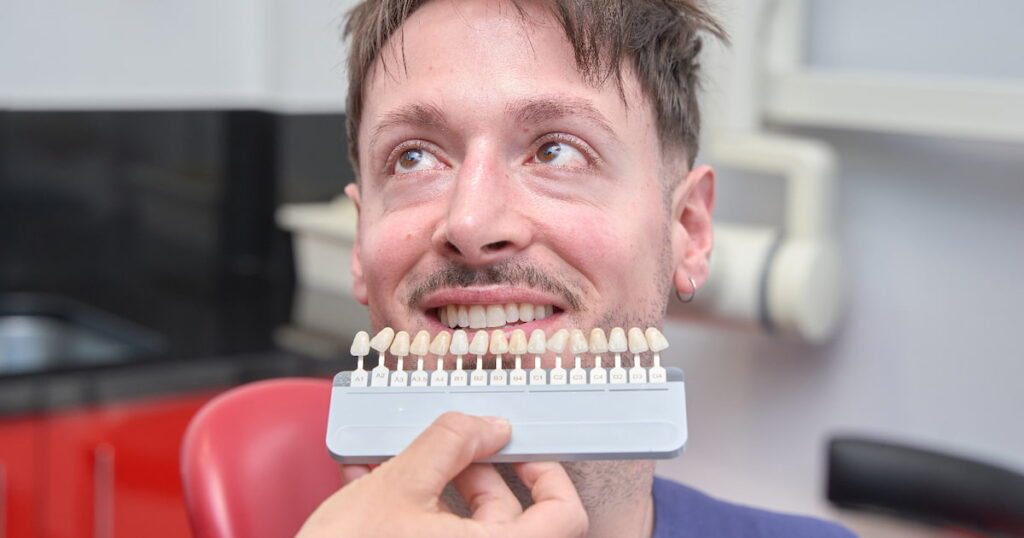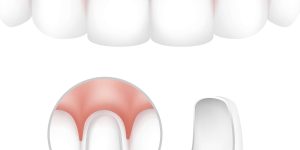Have you ever asked yourself, “is dental veneer right for me?”. Well, if you have, you may need to read this blog. If you’re considering enhancing your smile, understanding the pros and cons of dental veneers is a must. These cosmetic dentistry solutions are popular for transforming teeth into a flawless, natural-looking smile, but they come with benefits and challenges you should know before deciding. Here’s everything you need to know about dental veneers to help you make an informed choice.
| Pros | Cons |
| Mimics the look of natural teeth. | Veneers can be expensive, depending on the material and dental practice. |
| They are resistant to stains, so your smile stays bright. | Once applied, they require removal of a thin layer of enamel. |
| With proper care, they can last 10-15 years or more. | Some people experience tooth sensitivity after veneer placement. |
| Veneers provide a fast solution to dental imperfections. | Veneers can chip or crack, especially if you grind your teeth or chew hard items. |
| The process typically requires little to no anesthesia. | Due to the enamel removal, the procedure cannot be undone. |
| Aesthetic boost, especially for people with discolored or misshaped teeth. | Not suitable for those with severe tooth decay or gum disease. |
Now, if you still want to dig deeper to get your proper answer, keep reading and you’ll find everything you need.
Pros of Dental Veneers
Every type of veneer can give you so many advantages and to be honest, it’s a really good deal. But here, let’s talk about some of the most important ones.
1. Improved Appearance
One of the main reasons people choose dental veneers is the dramatic improvement in their smile. Veneers effectively hide imperfections such as discoloration, chips, and uneven teeth, creating a polished and symmetrical look.
In our practice, we once treated a patient who had been self-conscious about her smile for years due to severely discolored and chipped teeth. She opted for porcelain veneers, and the transformation was remarkable. After the procedure, she couldn’t stop smiling and shared how much her confidence had improved. Seeing her joy reminded us why veneers are such a powerful option for patients seeking a life-changing smile upgrade.

2. Stain Resistance
Porcelain veneers, in particular, are highly resistant to stains from coffee, tea, or wine. This means you can enjoy your favorite beverages without worrying about discoloration. However, while they are stain-resistant, regular dental hygiene is still crucial to maintain their bright appearance.
3. Long-Lasting Solution
According to Everyday Health, when properly cared for, veneers can last anywhere from 10 to 15 years, making them a durable and reliable solution for enhancing your smile. Porcelain veneers tend to outlast composite veneers due to their strength and resistance to wear. Their longevity is one of the key reasons patients consider them a worthwhile investment.
Cons of Dental Veneers
Obviously just like any other procedure, veneers have their own disadvantages. Here, we discuss some of the most important ones.
1. Irreversible Procedure
One of the most significant drawbacks of dental veneers is that the procedure is irreversible. A thin layer of tooth enamel is removed to fit the veneers, which means your natural teeth will always require some form of restoration. This is a commitment, so it’s essential to weigh your options carefully before proceeding.
Wanna Show Off With Your Beautiful Smile?
Ready to enhance your smile? Contact Pearl Dental Group today for expert advice and personalized care. Let’s create a smile you’ll love to show off!
2. Potential for Damage
While veneers are strong, they are not indestructible. Biting into hard objects or using your teeth as tools can cause them to chip or crack. Additionally, veneers do not protect your natural teeth from decay, so maintaining good oral hygiene is critical to avoid complications.
3. Cost Considerations
The cost of veneers can be a barrier for some, as they are generally more expensive than other cosmetic treatments. Porcelain veneers typically range from $800 to $2,500 per tooth, while composite veneers cost less but may require more frequent replacements. Insurance often doesn’t cover veneers since they are considered a cosmetic procedure.
Are Dental Veneers Right for You?
Dental veneers are an excellent option for individuals looking to improve their smile and address cosmetic concerns like chipped, stained, or uneven teeth. However, they may not be suitable for everyone, especially those with weak or damaged teeth, as the procedure requires a healthy base for support. Consulting with a cosmetic dentist can help determine whether veneers or alternative treatments, such as dental bonding or crowns, are a better fit for your needs.
Please feel free to contact us at Pearl Dental Group to get in touch with our dentists and receive high-quality dental veneers, tailored to your needs and dental condition.
FAQs About Dental Veneers
-
Are veneers the right choice for fixing chipped or stained teeth?
Yes, veneers are an excellent choice for fixing chipped or stained teeth. They provide a durable and natural-looking solution that can restore your smile’s appearance.
-
Do veneers look natural, or will they make my teeth look fake?
When done correctly, veneers look incredibly natural. They are designed to match the color, shape, and size of your natural teeth for a seamless blend.
-
How much tooth enamel needs to be removed for veneers, and is it reversible?
A small amount of enamel is removed to fit the veneers, typically about 0.5 millimeters. This process is not reversible, as the enamel doesn’t grow back.
-
Are dental veneers stain-resistant, or will they discolor over time?
Porcelain veneers are highly stain-resistant, so they maintain their color much longer than natural teeth. Composite veneers may be more prone to staining but can be polished to restore their appearance.
-
Are veneers a good option for people with weak or damaged teeth?
Veneers may not be ideal for weak or damaged teeth. In such cases, crowns or implants might be better alternatives, as they provide more structural support.









